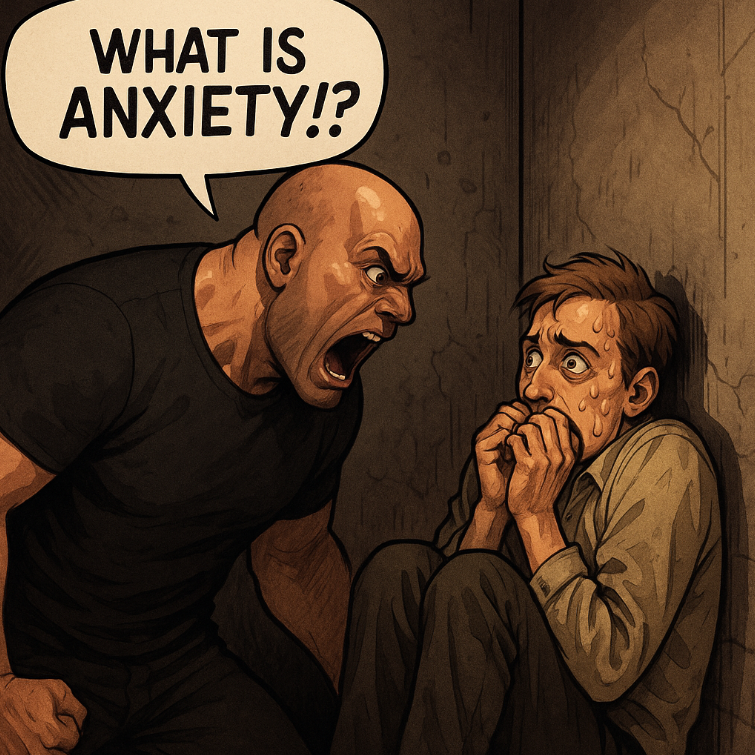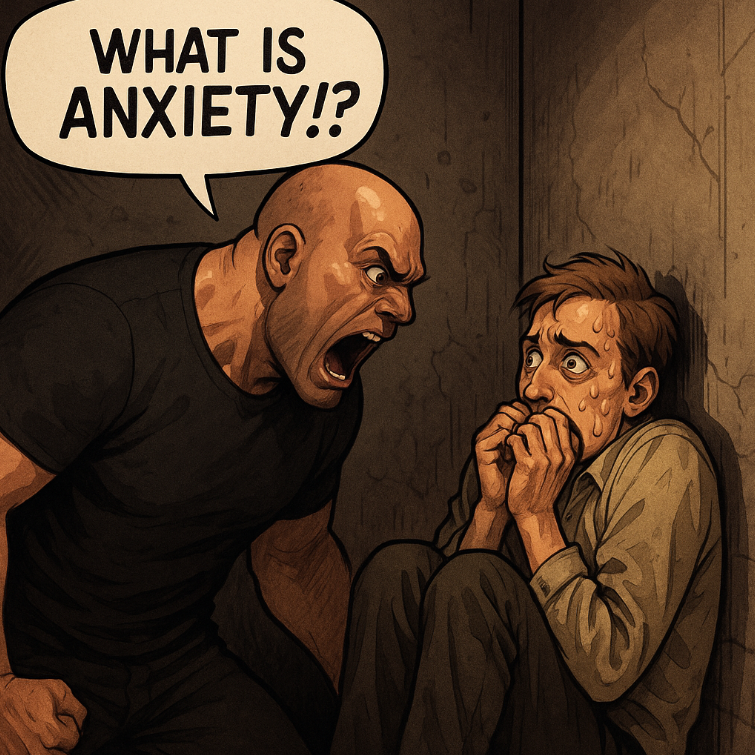What Is Anxiety?
/Anxiety is dread about a future you can't cope with.
It’s not fear of what’s happening now - but what might happen, what could go wrong, and whether you'll survive it.
Clinically, anxiety is defined as a state of heightened worry, tension, or arousal (stress) in response to a perceived threat - often persistent and disproportionate to the actual situation.
Anxiety, in its mild form, is called 'worry' or 'nerves'. But when the volume increases, it can spiral into sleepless nights, racing thoughts, and a sense of impending doom - even if you can't explain why.
Process vs. Personality
Short-term anxiety often passes on its own. But long-term anxiety usually needs a different kind of attention.
Anxiety can be a short-term process - a contextual mood or state - or a long-term one: a stable personality trait (temperament), or chronic pattern.
People who are wired for higher anxiety usually score higher on the Big Five Personality trait of Neuroticism.
Short-Term Anxiety (Contextual)
Short-term anxiety is common when there's an upcoming event that matters, but you don't have full control over the outcome.
In a mild form, you might call it 'nerves'.
Examples are:
A job interview for a dream role
An exam that could change your career
Family court proceedings around custody or contact
Slamming the brakes on seeing a mobile speed camera when you've already got 9 points
In each case, something significant is at stake - but the outcome isn't fully in your control. Preparing for an exam doesn't guarantee you a pass. You can slow down, but you won't know if you were quick enough until the police letter doesn't drop.
Usually, once the event (outcome) passes - for better or worse - the anxiety dissipates. Though other emotional states may take its place e.g. disappointment or grief.
Sometimes though, the anxiety doesn't disappear afterwards. It morphs - into fears about not seeing your children again, or job security after a driving ban. That shift can be a sign of something deeper or more chronic.
Long-Term Anxiety (Trait or Chronic)
Some people are wired for higher anxiety. It's part of their biology. For others, anxiety persists because it's been rehearsed and reinforced - so it never really goes away.
1 Temperament and Sensitivity
Some people feel things more intensely. They're more sensitive. Not in the pejorative sense, but in the way a leaner tree sways in a breeze while a thicker one doesn't move. They pick up more, so they react more.
They often notice what others miss - changes in voice tone, facial expressions, foreseeing risks. But that sensitivity comes at a cost. In a way, life is somewhat louder for them.
2 Chronic Patterns of Anxiety
This is where anxiety stops being tied to a particular situation and becomes the emotional baseline.
Every action, decision, and interaction is charged with nervousness. You're constantly on high alert (hypervigilance) - scanning for what might go wrong.
Often, this signals a deeper truth: your nervous system no longer trusts the world is safe.
3 Avoidance and Reinforcement
Long-term anxiety is often reinforced by coping strategies. These are learned patterns which attempt to short-circuit anxiety in the moment - but often strengthen the cycle over time.
Examples include: avoidance, checking (as in OCD, reassurance-seeking, and over-preparing.
4 Morphing Anxiety
Sometimes anxiety 'jumps' from one topic or context to another, often when the imminent situation is resolved.
It isn't always obvious when it's happening, because your brain insists "no, this is definitely something worth worrying about", even if it wasn't before.
This is common in Generalised Anxiety Disorder (GAD) or Health Anxiety. A particular form shows up with phobias - e.g. where a fear of public transport stops you travelling far from home, or a fear of spiders stops you exploring new places.
5 When Anxiety Becomes a Disorder
Sometimes anxiety can be self-managed through learning and lifestyle. Other times, it can be debilitating.
You may have reached a 'clinical threshold' if your anxiety is:
Disproportionate to what's happening
Interfering with your work, relationships, or rest
Lasting more than a few months; or
Hard to control or explain.
If any of these are true, it might be time to consider support.
It's not that you're broken. Just that your nervous system is working overtime, and might need some help to be dialled down.
Help isn't about fixing you. It's helping you feel safe enough to stop bracing all the time.
Looking for help with Anxiety? Counselling and Hypnotherapy in Leighton Buzzard can help you. Get in touch now.






![How to BOSS Social Interaction with Confidence [VIDEO]](https://images.squarespace-cdn.com/content/v1/587289343a0411b6dbcf0549/1742033997006-THJI34GHLX1X7B8HXXR6/yt+thumbnail.PNG)
![Perfectionism: How Fear of Looking Stupid Will Hold You Back [VIDEO]](https://images.squarespace-cdn.com/content/v1/587289343a0411b6dbcf0549/1741156939260-VB46VI6UDOVTFZ7DABKQ/CaptureDB04032005.PNG)




![Confidence: Why It Isn't Real (And How You Build Confidence Anyway) [VIDEO]](https://images.squarespace-cdn.com/content/v1/587289343a0411b6dbcf0549/1614024483598-J959PU85YVWBUH7TWOK4/Confident.PNG)
